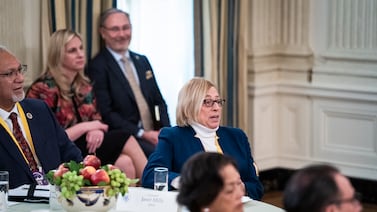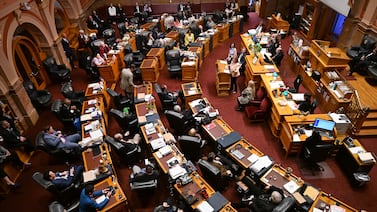Tuition-free preschool for Colorado 4-year-olds moved a step closer to fruition Thursday with a key vote in the state Senate, marking one of the last hurdles before Gov. Jared Polis signs the bill into law.
Lawmakers in the House still need to approve Senate amendments to the bill, which lays out how the state’s new early childhood agency and universal preschool program will run. It should head to the governor’s desk soon.
Universal preschool will roll out in the summer of 2023, providing 10 hours of preschool to 4-year-olds statewide regardless of family income. Funding will come from the state’s existing preschool program, which serves children with certain risk factors, and from proceeds of a nicotine tax Colorado voters approved in 2020.
The new program represents a big win for Polis, who pledged on the campaign trail in 2018 to launch universal preschool and is up for reelection later this year. It also represents a sea change for Colorado, dramatically expanding the government’s early education footprint with the hope that more children will get early experiences that help them succeed in school.
The Senate passed the bill Thursday on a 24-11 vote, with most Republicans voting no.
Earlier in the week, after the bill passed the second of three votes in the Senate, several lawmakers spoke passionately about the potential of the new preschool program and state agency.
Sen. Janet Buckner, an Aurora Democrat and one of the bill’s sponsors, said the new department will be a one-stop shop for parents, cutting the hassle of going from agency to agency to apply for different programs.
“Parents can go to one place to find out what they are eligible for and not leave services on the table,” she said.
Sen. Julie Gonzales, a Denver Democrat, said greater access to early education will help close achievement gaps early on.
“This is one of the most concrete ways that we have to advance structural equity as we continue to rebound from the impacts of the pandemic,” she said.
Other lawmakers criticized the bill.
Sen. Barbara Kirkmeyer, a Brighton Republican, said the new preschool program will create a new entitlement program that dwarfs other publicly funded social programs run by the state. An entitlement is open to everyone who meets a program’s eligibility criteria. In the case of universal preschool, that means all 4-year-olds in Colorado whose families want a spot.
Kirkmeyer also expressed doubt that the state’s plan to create a simple one-stop early childhood application process will work, citing previous misfires in state efforts to create unified systems for public assistance, food benefits, and other human services programs.
“The people who will suffer the consequences are children and families in this state that are eligible to receive certain benefits and in all likelihood will have some difficulty getting those benefits,” Kirkmeyer said before Thursday’s vote.
Regardless of party, most people agree that the new early childhood agency and universal preschool program represent a big lift for the state in a relatively short period of time.
Senate President Stephen Fenberg, one of the bill’s sponsors, called the bill “critically important” but also acknowledged it will make big and disruptive changes. He noted that the bill calls for an independent evaluation of the new department within a few years.
“We need to go in on this together, with eyes wide open, with as many voices at the table,” he said. ”We will have a very intentional conversation as a body based on an independent review and ask ourselves what should change.”
The new early childhood department is ramping up this spring, with more than a dozen programs slated to move to the agency from the state’s education and human services departments this summer. The new department will also manage the universal preschool program.
Here are some other key provisions of the bill.
- Provides 10 hours of tuition-free preschool for 4-year-olds statewide, as well as a smaller number of 3-year-olds — those who have disabilities or who have certain risk factors.
- Gives the executive director of the new department the authority to make rules, in consultation with an advisory committee.
- Establishes the role of “local coordinating organizations” — school districts, non-profits, and other groups charged with administering universal preschool in local communities.
- Pledges to provide universal preschool options in various settings, such as public schools, private centers, and homes.
- Charges the new department with creating a single application for publicly funded early childhood programs, including universal preschool.
Ann Schimke is a senior reporter at Chalkbeat, covering early childhood issues and early literacy. Contact Ann at aschimke@chalkbeat.org.







